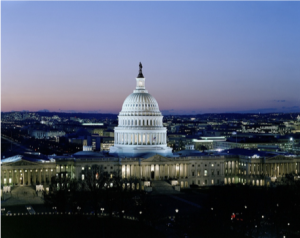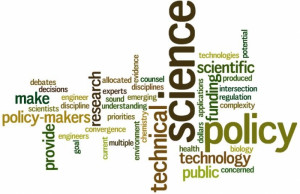By Vicky Kanta At every career development event, PhD students and postdocs are reminded of how valuable their training is, even outside the scope of academic careers. Presenting in front of large audiences and summarizing complicated topics in a short time are some of the so-called “soft skills” that come along with a STEM PhD. These advantages help scientists land jobs in almost every sector of industry and remain highly competitive in diverse career paths. One often overlooked line of work for STEM PhDs is politics. Politicians and scientists have many things in common: they must both educate themselves on complicated topics in order to make a decision, they present their work in front of large audiences, and usually try to convince people that hold an opposing view to their own. In many countries, it is very common for elected officials to have obtained a PhD and even reach the highest levels in government. Surprisingly, that is not true in the United States. In a recent article published in Scientific American, we learn that even though 2018 was a record year for scientists running for congress, only three elected members are doctorate holders. In this everyday turmoil of scientific advances and emerging issues, we need more policymakers with a scientific background. However, running for any type of office requires effort and preparedness. How can young scientists make the first step towards a future career in politics? 
- Stay informed
Knowing all the recent advances in science policy and how they can affect our lives is undoubtedly one of the most important things for scientists interested in politics. Thankfully, there are plenty of resources out there. Most broad interest scientific journals have news articles on emerging policy topics (e.g. Nature News). Furthermore, scientific societies usually have webpages on policy news relevant to their field. Finally, even regular news websites (e.g. The Guardian) often devote articles to recent scientific advances and their policy implications.
- Get involved locally
The widespread interest in science-related politics has had a very positive impact on most campuses; local science policy and advocacy groups have emerged in universities all over the country. For example, Rutgers has a very active group (SPAR) that is organizing interesting and informational events as well as engaging local elected officials. Getting involved in a local group can help scientists familiarize themselves with important policy topics and also learn how to work in groups to achieve their advocacy goals.
- Get hands-on experience
As for any other career path, finding opportunities to accumulate experience is crucial. Luckily, there are many science policy fellowships that allow just that. Perhaps one of the most well-known is the Science & Technology Policy Fellowship from the American Association for the Advancement of Science, which attracts many applicants from all scientific backgrounds. Recipients of this fellowship have the opportunity to work for different branches of the government, overseeing science policy topics and fostering collaborations between different departments to solve related issues. Many societies also provide similar opportunities, such as the National Academies of Science, Engineering and Medicine and the Science and Technology Policy Institute. Talking to some of the fellowship alumni can be very helpful to new applicants, since these positions are often very competitive.
- Communicate your science
Getting involved in politics means communicating with people from different backgrounds. This can be challenging for many of us, because we do not often explain our complicated, highly specialized work to people outside our field. One way to practice this is to get a volunteer position in science communication. Colleges often have local groups that communicate science to the local community. Furthermore, there are many volunteering opportunities for mentoring high school students (e.g. the New York Academy of Scientists mentorship programs).
- Get the most out of your current training
Ultimately, our current training is what will make us competitive scientists and thus, competitive future policymakers. Make sure that you take every opportunity to present your work, collaborate with different people and expand your knowledge. Balancing research with involvement can be challenging, but multitasking is already an integral part of our everyday lives as scientists.  Overall, the future is promising for STEM PhD holders in politics. In the 2018 midterm elections, more than 200 scientists ran for office. A growing number of PhD recipients are entering the job market every year and getting involved in policy and advocacy straight out of their training. If running for office gains traction as a viable option for scientists, then the balance will tip in our favor. Hopefully, the next generations of science-educated elected officials will start implementing important policies that will change our lives for the better. This article was edited by Brianna Alexander and Tomas Kasza.
Overall, the future is promising for STEM PhD holders in politics. In the 2018 midterm elections, more than 200 scientists ran for office. A growing number of PhD recipients are entering the job market every year and getting involved in policy and advocacy straight out of their training. If running for office gains traction as a viable option for scientists, then the balance will tip in our favor. Hopefully, the next generations of science-educated elected officials will start implementing important policies that will change our lives for the better. This article was edited by Brianna Alexander and Tomas Kasza.